Key Points to Explain a Failed Drug Test

How to Explain a Failed Drug Test: Understanding the Impact of a Failed Drug Test
Failed drug test can be an unsettling experience, whether it occurs during a job search or while employed. While the immediate concern often centers on potential employment consequences, understanding the broader impact of a failed drug test is crucial for individuals and employers alike. The consequences of a failed drug test can range from missed job opportunities to legal complications, and knowing how to approach the situation responsibly and professionally can significantly affect the outcome. In this first part of our comprehensive guide, we will explore the concept of a failed drug test, the reasons why individuals fail drug tests, the common drugs tested in employment drug screenings, and the significance of drug testing in the workplace.
What Does It Mean to Fail a Drug Test?
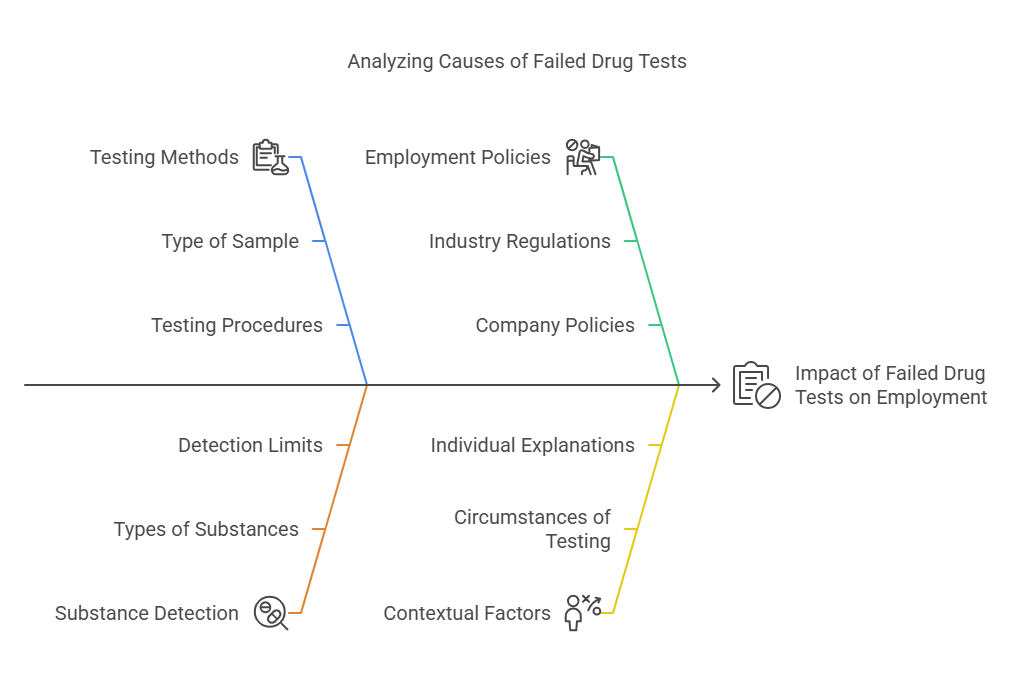
A failed drug test occurs when an individual’s sample—whether urine, blood, saliva, or hair—tests positive for prohibited substances or drugs. In employment contexts, this failure can severely affect one’s prospects, including job opportunities, promotions, or even the ability to maintain current employment. Depending on the industry and job requirements, a failed drug test could result in immediate dismissal, delays in the hiring process, or the termination of existing employment.
Drug tests are designed to identify the presence of illegal substances or controlled drugs that may impair a person’s ability to perform their job duties safely or efficiently. Many industries require drug testing as part of the hiring process or as ongoing testing during employment to ensure workplace safety, comply with industry regulations, and maintain a productive work environment.
However, not all failed drug tests are straightforward, and individuals may face challenges in explaining or justifying the result. The context of the test, the substances tested, and the reasons behind the failed result all contribute to the complexity of the situation. In this part, we will delve deeper into the reasons for failing a drug test and explore the factors that influence whether a failure is significant enough to affect one’s employment or hiring status.
Reasons for Failing a Drug Test
There are several reasons why someone might fail a drug test, and not all are related to intentional drug use. Below, we will explore the most common reasons individuals may fail a drug test.
1. Use of Illegal Substances
The most direct reason for failing a drug test is the use of illegal drugs. Substances such as cocaine, marijuana, heroin, methamphetamines, and synthetic drugs are banned substances in most workplaces. When individuals use these drugs, either recreationally or habitually, the drug will show up in their system during the testing process, resulting in a failed test.
It’s important to note that while marijuana is legal in some states, it remains illegal at the federal level, and many employers still require drug testing to ensure compliance with their policies. Individuals who knowingly use illegal drugs are at risk of both legal consequences and professional repercussions if they fail a drug test.
2. Prescription Medications
In some cases, individuals may fail a drug test due to prescription medications. Many prescription drugs can cause a positive result on a drug test, particularly if the drugs fall into categories like opioids, benzodiazepines, or amphetamines.
For example, individuals who use medications like oxycodone (for pain) or Adderall (for ADHD) may fail a drug test due to the presence of these substances in their system, even though they are taking them legally under the guidance of a doctor. Employers may not be aware of the individual’s medical conditions or prescriptions, which is why disclosure of medications to the employer or drug testing administrator is essential.
In these situations, an individual should be prepared to explain the reason for the positive test result and provide documentation from a healthcare provider to confirm that the medication is prescribed.
3. Over-the-Counter Medications
In addition to prescription medications, certain over-the-counter (OTC) medications or dietary supplements can lead to a failed drug test. For instance, medications such as cold medicines containing pseudoephedrine can result in a false positive for amphetamines. Similarly, herbal supplements like kratom may cause unintended results in some drug tests.
It is essential to understand the ingredients of any OTC or supplement before using them, especially if there is a possibility that drug testing could be part of a workplace requirement. If you are unsure about the potential impact of a specific medication or supplement, it is always wise to consult a doctor or inform the employer ahead of time to mitigate potential issues.
4. Contaminated Products or Secondhand Exposure
A less common but still significant reason for failing a drug test is contamination. In some instances, individuals may unknowingly ingest substances that cause a positive result. This could be from contaminated food or beverages or from exposure to secondhand smoke or vapors from illegal substances.
For example, being in an environment where others are smoking marijuana or using other drugs could result in trace amounts of these substances being present in the system. Although this scenario is rare, it is worth mentioning because some individuals may inadvertently fail a drug test even though they have not directly consumed the drug themselves.
In cases where contamination or secondhand exposure is a possible cause, individuals should provide detailed explanations of the circumstances and request a retest if appropriate.
5. Mismanagement of Medication
A more common situation is mismanagement of medication. In some cases, individuals may not follow the prescribed dosage of a medication, either taking too much or too little, which can affect the outcome of a drug test. This mismanagement can happen with prescription medications, especially if the person is trying to self-medicate or does not fully understand the proper usage of the medication.
For example, someone taking prescription painkillers may inadvertently take a higher dosage than prescribed, leading to higher levels of the drug in their system, which will show up on a drug test. Similarly, if an individual forgets to take their medication or miscalculates the dosage, they may end up with a positive result for a drug they are legally prescribed.
Being transparent and honest about any mismanagement of medication is essential when explaining the results of a failed drug test.
Common Drugs Tested in Employment Drug Screenings
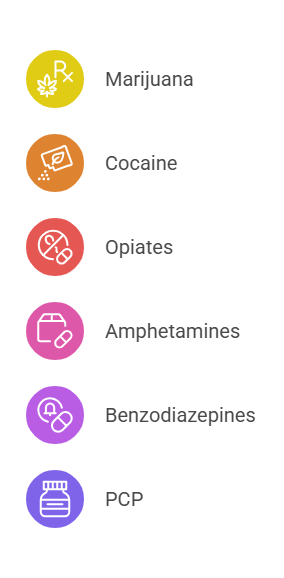
Most employment drug tests focus on a standard panel of drugs. Below, we will review the most commonly tested substances and how they are detected.
1. Marijuana (THC)
Despite being legalized in some states, marijuana remains a common substance tested for in drug screenings. Marijuana contains tetrahydrocannabinol (THC), the psychoactive compound that impairs cognitive and motor functions. It is one of the most widely tested drugs in employment-related drug tests, and its presence can disqualify individuals from certain positions, particularly in safety-sensitive or federal-regulated industries.
2. Cocaine
Cocaine is a stimulant that produces feelings of euphoria and energy. It is illegal in all forms and is frequently included in employment drug tests. Cocaine can remain detectable in the system for several days to weeks, depending on factors such as the amount used and the individual’s metabolism.
3. Opiates
Opiates like morphine, codeine, heroin, and synthetic opioids (e.g., oxycodone, hydrocodone) are commonly tested for due to their potential for misuse and impairment. These substances can be prescribed for pain management but are also highly addictive, which makes them an important factor in maintaining workplace safety.
4. Amphetamines
Amphetamines, including both prescription drugs like Adderall (for ADHD) and illegal drugs like methamphetamine, are often included in standard drug screenings. These substances can cause a range of effects, from increased alertness to dangerous levels of aggression, and can impair cognitive function and motor skills.
5. Benzodiazepines
Benzodiazepines are central nervous system depressants used to treat anxiety, insomnia, and other conditions. Medications such as Xanax, Valium, and Ativan fall into this category. These substances can impair judgment, memory, and motor skills, which is why they are often included in drug screenings.
6. Phencyclidine (PCP)
PCP, also known as “angel dust,” is a hallucinogenic drug that can cause severe psychological and physical effects. While it is not as commonly abused as other substances, it is often tested for in pre-employment and random drug screenings in high-risk industries.
The Importance of Drug Testing in Employment
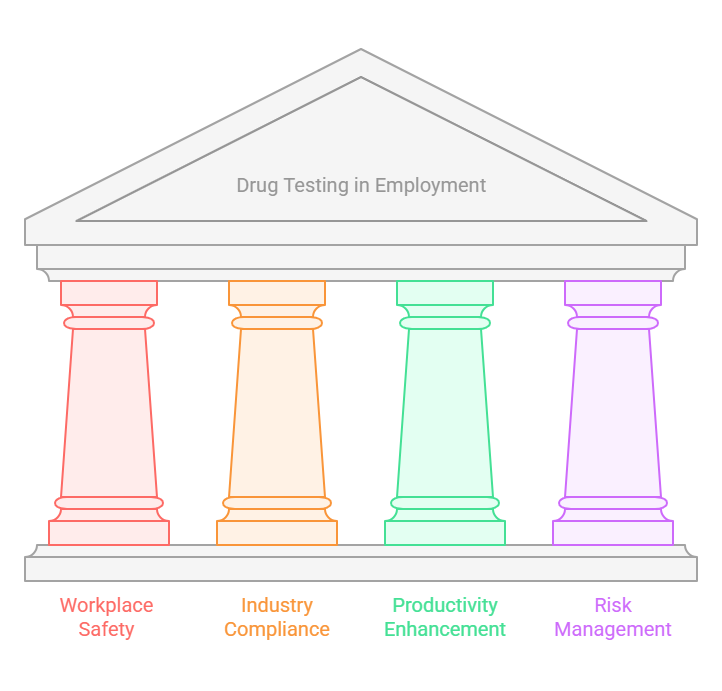
Drug testing is a fundamental practice in many industries, especially those that prioritize safety, compliance, and efficiency. Employers conduct drug testing to ensure that their workforce is operating at full capacity and to minimize the risk of accidents, errors, and legal issues.
Maintaining Workplace Safety
The most crucial reason for drug testing is to ensure that employees are not under the influence of substances that could impair their ability to perform their job duties safely. In high-risk industries like construction, transportation, healthcare, and manufacturing, drug testing is essential to prevent accidents, injuries, or fatalities caused by impaired employees.
Compliance with Industry Regulations
In some industries, such as transportation or aviation, federal regulations mandate drug testing as part of the hiring process and ongoing employment. These industries are heavily regulated to ensure public safety, and drug testing is an essential component of maintaining compliance with these regulations.
Promoting Productivity
Employees who are under the influence of drugs may experience decreased productivity, impaired decision-making, and higher rates of absenteeism. Employers use drug testing as a preventive measure to ensure that their workers are functioning at peak performance.
Risk Management and Legal Protections
By conducting drug tests, employers can protect themselves from potential lawsuits, insurance claims, and worker’s compensation claims that might arise from accidents involving impaired employees. Drug testing helps mitigate these risks and provides legal protection in case of workplace incidents.
Initial Reactions to a Failed Drug Test
Failing a drug test can be a stressful and emotional experience. Individuals may feel embarrassed, frustrated, or even fearful about how their failure will impact their career prospects. However, it is essential to stay calm and address the situation in a professional and measured manner. In the next part of this article, we will discuss how to explain a failed drug test to an employer or hiring manager and how to navigate this challenging situation.
How to Explain a Failed Drug Test
Failing a drug test can be a difficult situation, but how you respond can significantly influence the outcome. Whether you’re explaining the failed result to a potential employer or your current employer, being honest, clear, and calm is critical. In this second part of our comprehensive guide, we will explore the steps you should take immediately after a failed drug test, possible explanations for a failed test, and how to address the issue with employers or hiring managers. We will also discuss when it might be appropriate to request a retest and how to handle such a situation professionally.
Steps to Take Immediately After a Failed Drug Test
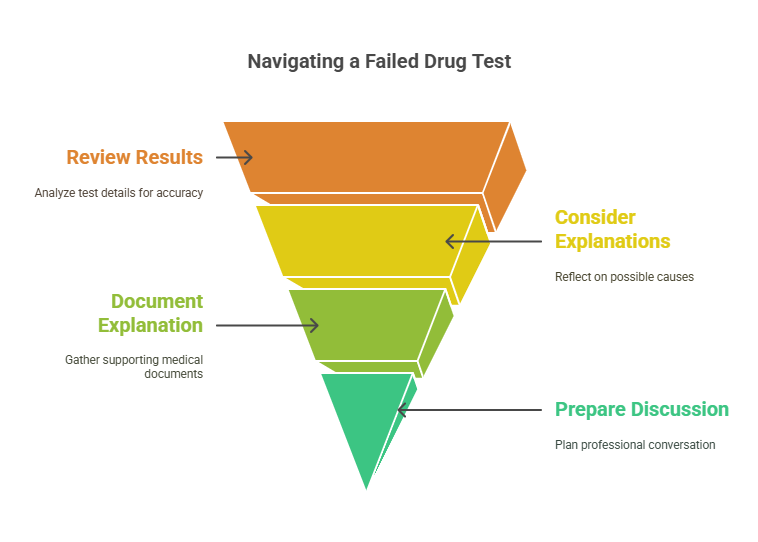
When you fail a drug test, it’s essential to approach the situation in a calm and methodical manner. Reacting impulsively or defensively can make the situation worse, especially if you fail to address the issue with clarity and professionalism. Below are some of the immediate steps to take following a failed drug test:
1. Review the Results Carefully
After receiving your failed drug test result, the first thing you should do is carefully review the report. Drug testing results usually include detailed information such as the substances tested for, the substances detected, the concentrations, and the testing method. Take time to understand what substances were detected in your system and at what levels.
If you don’t understand any part of the result, ask the testing facility or lab for clarification. Make sure there are no discrepancies or errors in the report before moving forward.
2. Consider Possible Explanations
Before you address the issue with an employer, take some time to consider the possible explanations for the failed drug test. There could be several reasons why a drug test might show a positive result, and not all of them are related to intentional drug use. These explanations can include:
- Prescription medications: As discussed in Part 1, prescription drugs can result in a failed drug test. If you were taking medication prescribed by a doctor, consider how this may have affected the test results.
- Over-the-counter (OTC) medications or supplements: Some OTC medications or herbal supplements may cause positive results, even though they are not illegal.
- Accidental exposure or contamination: In rare cases, people may fail a drug test due to secondhand exposure to substances or contamination from external sources.
- Medication mismanagement: If you made any errors in taking prescribed medications, this might have contributed to the positive result.
Reflecting on the circumstances surrounding your drug use and the drug testing process will help you prepare a clear and accurate explanation.
3. Document Your Explanation
If you believe the failed drug test resulted from legal prescription medication or an over-the-counter medication, be prepared to provide documentation from your healthcare provider. This documentation can help confirm that the substances detected in your system were legally prescribed and used as directed. It’s always helpful to have written evidence to support your explanation.
4. Prepare to Discuss the Situation Professionally
Once you have reviewed your results and considered possible explanations, it’s time to prepare for the conversation with your employer. You should be ready to discuss the situation in a calm and professional manner, without becoming defensive. Be honest about what happened and explain your side of the story without exaggerating or minimizing the issue.
Avoid blaming the employer, the testing process, or external circumstances. Instead, take responsibility for your actions and be transparent about any factors that contributed to the failed test.
Possible Explanations for a Failed Drug Test
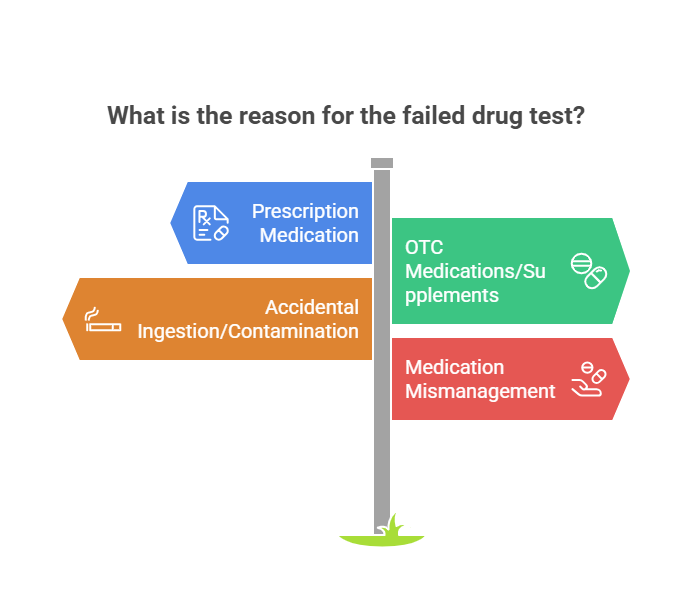
A failed drug test doesn’t always mean that someone intentionally used illegal substances. There are several reasons why a person might fail a drug test that can be explained in a professional and honest way. Here are some possible explanations for failing a drug test:
1. Prescription Medication
The most common reason for failing a drug test, aside from illegal drug use, is the use of prescription medication. Certain prescription drugs, especially painkillers (e.g., opioids like oxycodone or morphine) and anti-anxiety medications (e.g., benzodiazepines), can lead to a positive result on a drug test. If you were prescribed these medications, explain that they were taken under the guidance of your healthcare provider.
If your employer or potential employer has concerns, offering a copy of your prescription or providing a letter from your doctor can help explain why these substances were in your system.
2. Over-the-Counter (OTC) Medications or Supplements
In addition to prescription drugs, certain over-the-counter medications and dietary supplements can cause a false positive on a drug test. For instance, medications like cold medicine containing pseudoephedrine can result in a positive test for amphetamines. Additionally, herbal supplements like kratom can show up as opioids or other controlled substances in a drug test.
If you suspect that an OTC medication or supplement may have led to the failed drug test, be prepared to provide the name of the medication and its ingredients. If necessary, consult your healthcare provider or pharmacist to confirm whether the substance could have interfered with the test results.
3. Accidental Ingestion or Contamination
Sometimes, people unknowingly consume substances that lead to a positive drug test result. This might happen in a variety of scenarios, such as:
- Secondhand smoke exposure: Being in an environment where others are smoking marijuana or using other substances could result in trace amounts of those substances showing up in your system.
- Food contamination: Some foods, especially those containing poppy seeds, can cause trace amounts of opioids to appear in your system.
In these situations, you should calmly explain the circumstances in which contamination or accidental exposure may have occurred. While these scenarios are rare, employers may be more willing to accommodate a retest if the explanation is reasonable.
4. Medication Mismanagement
Sometimes, people fail drug tests due to mistakes in managing their prescribed medications. This could happen if someone takes more medication than prescribed or inadvertently takes a medication that wasn’t prescribed to them. For example, a prescription painkiller taken in excess could cause a positive test for opioids, even though the medication was prescribed for a legitimate medical condition.
If you believe that your failed drug test was caused by medication mismanagement, you should be transparent about the situation and take responsibility. Explain how the error occurred and what steps you will take to ensure it doesn’t happen again.
How to Address the Issue with Employers
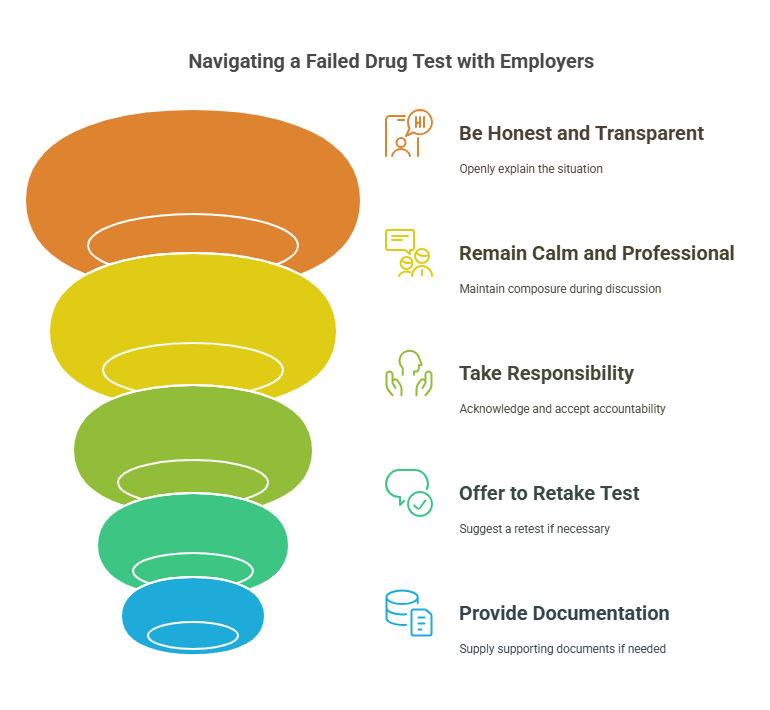
Once you have reviewed your failed drug test results and considered the possible explanations, you’ll need to explain the situation to your employer or hiring manager. How you handle this conversation is essential, as it can impact the final decision regarding your employment. Here’s how to approach this delicate situation:
1. Be Honest and Transparent
The most important thing when explaining a failed drug test is to be honest. Trying to hide or lie about the cause of the positive result can make the situation worse and damage your credibility. If you were using prescription drugs or over-the-counter medications, be upfront about it. Employers appreciate transparency and will likely be more understanding if you explain the situation openly.
If the test result was due to accidental exposure or contamination, explain the circumstances in detail. Provide any necessary documentation, such as a note from a doctor, to support your explanation.
2. Remain Calm and Professional
A failed drug test can be an emotional and stressful situation, but it’s crucial to stay calm and composed during the discussion with your employer. Do not become defensive or confrontational. Instead, present your explanation clearly and confidently, without trying to minimize or exaggerate the issue.
If you have a reasonable explanation, such as prescription medication or accidental exposure, explain it calmly and professionally. Employers will appreciate your maturity in handling the situation.
3. Take Responsibility
Even if the drug test was caused by a legitimate factor such as a prescription, it’s important to take responsibility for the situation. Acknowledge that drug testing is important for workplace safety, and express your understanding of the employer’s need to ensure that their employees are drug-free. If the failure was due to a misstep or oversight, admit it and explain how you plan to avoid it in the future.
Taking responsibility demonstrates integrity and accountability, qualities that employers value.
4. Offer to Retake the Drug Test
If you believe that your drug test result was inaccurate or caused by contamination, you may want to request a retest. Be prepared to explain why you believe the original test result was wrong and suggest a retest to clarify the situation. Most employers are willing to accommodate a retest, especially if there is a reasonable explanation and if the situation is handled professionally.
5. Provide Documentation (When Necessary)
In cases where the failed drug test was due to prescription medication or an over-the-counter drug, offer to provide documentation from your doctor or pharmacist to support your explanation. This can help employers understand that the substances detected in your system were legally prescribed and taken as directed. Providing this documentation adds credibility to your explanation and can help resolve any concerns the employer may have.
When to Request a Retest
In some situations, requesting a retest may be appropriate, especially if you believe the original test result was inaccurate or caused by a mistake. For example:
- If you suspect contamination: If you believe that contamination, such as secondhand smoke or food consumption, led to the failed drug test, a retest can help clarify the results.
- If the test was flawed: If there were any issues with the testing procedure (e.g., sample mix-up or lab error), requesting a retest can provide more reliable results.
When requesting a retest, approach the employer respectfully and provide a clear explanation of why you believe a retest is necessary.
Legal Aspects of a Failed Drug Test
A failed drug test isn’t just a personal issue—it has legal implications that could affect your employment status, rights, and future job prospects. Both employees and employers must understand the legal framework surrounding drug testing to ensure they’re compliant with the law and avoid any legal pitfalls.
1. Discrimination and Employment Rights
In many jurisdictions, discrimination laws protect individuals from being unfairly penalized or fired due to a failed drug test, especially if the result was caused by prescription medication or an over-the-counter drug. However, employers are often permitted to use drug tests as a means of ensuring safety and maintaining productivity, particularly in industries that require a drug-free workplace, such as transportation, healthcare, or manufacturing.
Employers must ensure that their drug testing policies are applied fairly and consistently across all employees. Discriminating against a worker for taking prescription medication—without providing reasonable accommodations—could lead to legal consequences, including lawsuits under the Americans with Disabilities Act (ADA) or state-level anti-discrimination laws.
In states where medical marijuana is legal, it’s important to note that a failed drug test due to marijuana use can be a complex legal issue. While marijuana is legal for medical or recreational use in certain states, it is still considered illegal at the federal level. Employers in some states may be prohibited from firing or disciplining employees based solely on a positive marijuana test result if the employee has a valid medical prescription for it. Always check your state’s specific laws on marijuana use and employment.
2. Consent and the Fair Credit Reporting Act (FCRA)
The Fair Credit Reporting Act (FCRA) applies to background checks, including drug testing for employment. The FCRA mandates that employers obtain written consent from candidates or employees before conducting a drug test or any other background check. If an employer fails to obtain this consent, it could lead to legal consequences, such as lawsuits or penalties.
In addition, the FCRA ensures that an individual’s confidentiality is maintained throughout the testing process. Employers are required to handle drug test results with a high degree of privacy and must inform the employee if any action will be taken based on the results. This means that employers cannot disclose failed drug test results to unauthorized parties without the individual’s consent.
3. State-Specific Regulations and Laws
Drug testing laws vary widely from state to state. Some states have very strict laws governing the types of drug tests employers can administer, how they can use the results, and what substances can be tested for. It’s crucial to be aware of your state’s specific regulations on drug testing.
For instance, in states like California, Washington, and Colorado, which have legalized marijuana for medical or recreational use, employers may face limitations on how they handle positive drug tests for marijuana. These states have specific laws that require employers to accommodate employees who legally use marijuana for medical purposes, unless there is a compelling reason to dismiss them (e.g., if their job performance or safety is compromised).
States such as New York, Massachusetts, and Rhode Island have also passed laws that require employers to follow specific procedures when conducting drug tests, ensuring the process is fair and transparent. In contrast, states like Texas and Florida may have more lenient regulations regarding drug testing in the workplace.
As a result, it’s important to be aware of local labor laws, as they will directly impact how a failed drug test is handled and whether any legal recourse is available to the individual.
4. Confidentiality and Disclosure
The confidentiality of drug test results is paramount. Employers cannot disclose the results of a drug test to unauthorized parties. For example, if an employee fails a drug test, the employer is prohibited from sharing that information with coworkers or third-party contractors unless required by law. If an employer violates this confidentiality requirement, the employee may have grounds for a lawsuit based on a breach of privacy.
Furthermore, employees have the right to know the results of their drug test. If a test is positive, the employee should be provided with a detailed explanation of the result and the next steps. Many employers also give employees the opportunity to dispute the results if they believe there was a mistake or misunderstanding during the test.
Frequently Asked Questions (FAQs)
Now that we’ve covered the legal aspects of failed drug tests, let’s address some of the most common questions people have when faced with a failed drug test. Understanding these FAQs can help you navigate the process more effectively.
What are some common reasons someone might fail a drug test, besides intentional illegal drug use?
Common reasons include prescription medications, over-the-counter medications or supplements, contaminated products or secondhand exposure, and mismanagement of medication.
What steps should I take immediately after receiving a failed drug test result?
Review the results carefully, consider possible explanations, document your explanation (especially for prescription medications), and prepare to discuss the situation professionally.
How should I address a failed drug test with my employer or a potential employer?
Be honest and transparent, remain calm and professional, take responsibility, offer to retake the test if appropriate, and provide documentation if necessary.
What legal considerations are important regarding failed drug tests in employment?
Important legal considerations include discrimination and employment rights (including ADA protections), consent under the Fair Credit Reporting Act (FCRA), state-specific regulations and laws, and confidentiality of drug test results.
When might it be appropriate to request a retest after failing a drug test?
It may be appropriate to request a retest if you suspect contamination, if there were flaws in the testing procedure, or if you have a valid explanation for a false positive.
What are some common reasons someone might fail a drug test, besides intentional illegal drug use?
Common reasons include prescription medications, over-the-counter medications or supplements, contaminated products or secondhand exposure, and mismanagement of medication.
What steps should I take immediately after receiving a failed drug test result?
Review the results carefully, consider possible explanations, document your explanation (especially for prescription medications), and prepare to discuss the situation professionally.
How should I address a failed drug test with my employer or a potential employer?
Be honest and transparent, remain calm and professional, take responsibility, offer to retake the test if appropriate, and provide documentation if necessary.
What legal considerations are important regarding failed drug tests in employment?
Important legal considerations include discrimination and employment rights (including ADA protections), consent under the Fair Credit Reporting Act (FCRA), state-specific regulations and laws, and confidentiality of drug test results.
When might it be appropriate to request a retest after failing a drug test?
It may be appropriate to request a retest if you suspect contamination, if there were flaws in the testing procedure, or if you have a valid explanation for a false positive.
Conclusion
Explaining a failed drug test doesn’t have to be a daunting experience if you approach the situation with honesty, professionalism, and a clear understanding of your legal rights. Employers and employees alike must be aware of the laws that govern drug testing and ensure they are compliant with local regulations to avoid unnecessary legal risks. Whether you’re addressing the issue with a potential employer or a current employer, transparency and accountability are key to maintaining trust and professionalism.
If you find yourself in a situation where you need help navigating drug testing policies, understanding the legal implications, or explaining a failed drug test, Exact Background Checks is here to provide support. Our accurate and reliable drug screening services ensure that you’re fully informed about your rights and obligations in the drug testing process.
Remember, a failed drug test is not the end of the road—it’s an opportunity to demonstrate your professionalism and commitment to resolving the situation. By handling the situation with care, you can move forward in a positive direction.



